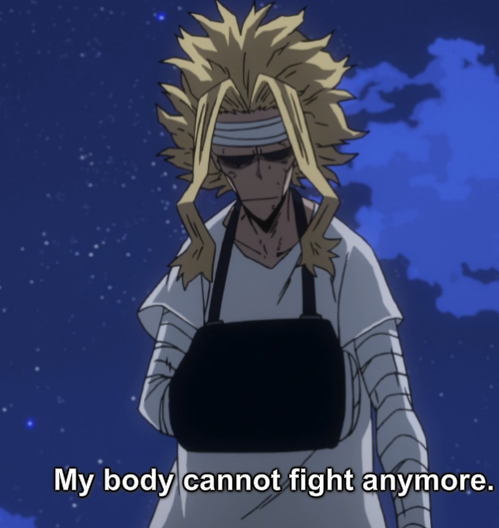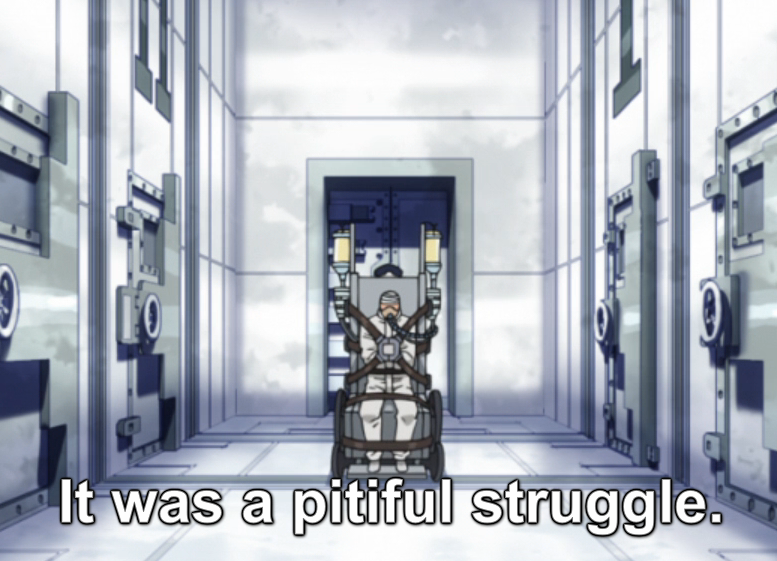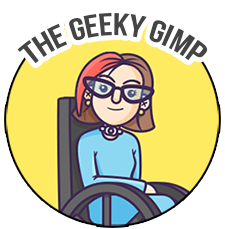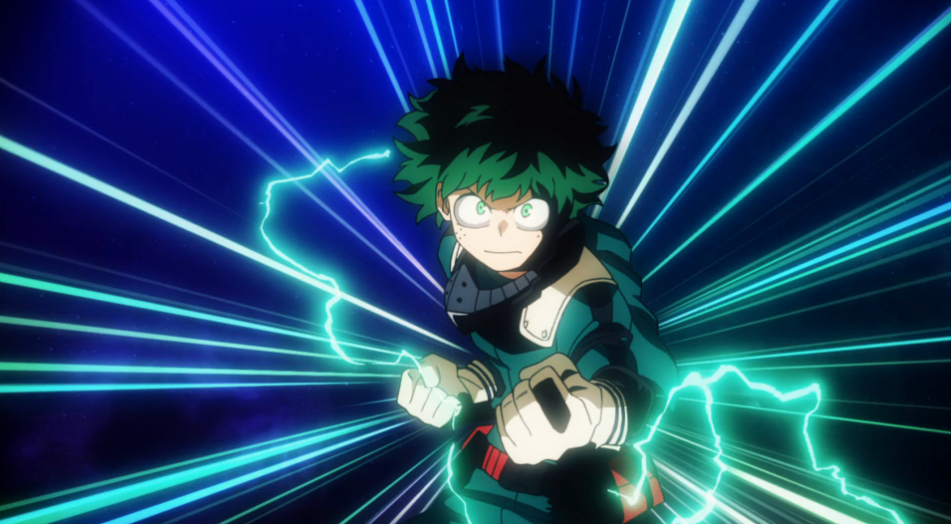- 1Share
The following contains spoilers for the show.
My Hero Academia is a new anime about a group of superheroes in training. Like most anime in its genre, known in Japan as shonen, it is action packed, filled with supernatural elements, and aimed at young men. One way that My Hero Academia stands out from its peers is the way it allows its characters to express their emotions in an open and direct fashion. This facet is what drew my attention to the show, and what continues to hold my attention.
I have noticed a strain of ableism running through it, though. In the world of My Hero Academia, eighty percent of the population has access to some form of supernatural ability, known as a Quirk. Having a powerful Quirk is a fast route to social power and fame. Some individuals, however, are born without a Quirk. These people, known as the Quirkless, receive shame and ridicule and are barred from many of the more influential positions in society.
In many ways, Quirkless characters are a metaphor for disabled people in reality. Both are the target of social pressures and are told what they can and cannot do, while still possessing a wide degree of competence. They both often have overly protective parents who, despite the best of intentions, reinforce ablest notions.
Midoriya is the main character of My Hero Academia and he begins the show Quirkless. As is often the case in works where the supernatural is real, his metaphorical disability is not allowed to continue. Instead, after Midoriya demonstrates his bravery and his compassion, despite being Quirkless, he gains the attention of All Might, the most powerful and famous of the heroes in the world.

All Might, after some consideration, decides to take Midoriya on as apprentice and lets him in on a secret: All Might’s Quirk can be transferred. Midoriya, after preparing as much as possible, takes on All Might’s Quirk and gains access to that great power. In an instant, his disability is erased and discussion of the Quirkless becomes a much rarer subject of conversation.
An argument can be made that Midoriya’s access to this Quirk can be seen as a kind of prosthetic. The Quirk cannot be removed, no, but it causes him pain and he cannot control it to the same level as other characters control their Quirks. It’s clear that this Quirk is foreign to Midoriya, even as he spends further training trying to bring it to a level that he has mastery over.
Personally, I would have rather the show kept Midoriya Quirkless. Later on in the series, it introduces the concept of hero devices – high-tech gadgets that can enhance a Quirk or capabilities in a variety of ways. Midoriya’s high intellect and a collection of hero devices could make him the Batman or Iron Man to All Might’s Superman. Furthermore, that setup would reflect the ways that assistive devices allow disabled people to live more full lives.
This is not the only way that My Hero Academia talks about disability. Both All Might and his main rival, All For One, are disabled in their own ways. All Might suffered a major injury at the hands of All For One, causing significant organ damage. As a result, he is able to maintain his heroic strength only for a limited amount of time each day, and collapses into an emaciated and slightly unsettling, but ultimately endearing, form when he is unable to maintain that strength. In many ways, this mirrors the way that chronic illness limits the amount of activity a person can perform in a given day, as expressed by spoon theory. All Might has his own spoons, and once he runs out of them, pushing past them can only be done at the cost of permanent damage.
All For One, meanwhile, had been seriously injured by All Might in a far more visible way, causing him to lose his eyes and to require a ventilator. Nevertheless, All For One is capable of bringing his full strength to bear in his final battle against All Might. Facial differences, as All For One has, are too often used to mark villains (see Erin’s post about Wonder Woman), with little concern for how such depictions are harmful towards real people with facial differences. To make matters worse, after his ultimate defeat, All For One is literally bound to a wheelchair in imagery that immediately drew disgust from Erin and I as we saw it. It’s heightened in the manga, where the facility that All For One is placed into prevents him using his sensory abilities, rendering him blind.

Despite all this, My Hero Academia is a series that is in communication with disability. It is written from a perspective that is all too willing to dip into harmful, ableist cliches, but it also handles its main characters with a degree of depth and care that demonstrates an interest in these topics, and its treatment of All Might is genuinely good. My Hero Academia is built on a legacy of other shonen series. Hopefully, the series that learn from My Hero Academia have a more nuanced and understanding view of disability.
Michael Meinberg is a freelance writer, game designer, and disability justice advocate. You can find him on Twitter or on his blog, Goat Song.


Good review!
I am particularly disturbed by the way that medical devices like respirators continue to be used to mark villains as if using a medical device somehow makes a person less human.
It’s particularly egregious in MHA, where things with the aesthetics of respirators appear constantly as part of hero costumes, but actual functioning medical devices are almost strictly for the use of villains.
That is really frustrating! I’m sorry to hear that.
Saying that Midoriya should’ve remained Quirkless is like saying a blind person should not be given a cane (I have been blind all my life so that was my first connection). I also made the disability connection when I first watched but in a slightly different way from you. Midoriya being quirkless is like being blind, and All Might giving him and training him in All For One is like teaching that blind person how to use a cane, or how to read braille. Why? Well neither of what I just said are instant “gang you’re fixed” cures, they’re tools and lessons that took years for a student to learn, and are proof that you have to work harder just to keep up with the other kids. I learned both of these in elementary school, and time had to be taken away from my classes so I was doing more learning. I can’t make as easy a connection to the “the power overwhelms you and hurts you,” but my point is that All For One can still be seen as a disabled person having an accommodation that allows them to be on the level of others, but it’s one of hte more complex ones that require practice and knowledge.
I appreciate your interpretation of One for All! That’s something that happens with metaphorical coding like this, different people are able to pull different interpretations from things. I, for one, saw One for All as a cure narrative, rather than an adaptive device narrative. That said, I can also see how it can be interpreted in your way. Ultimately, my feeling is that there’s enough ambiguity in the narrative to support both interpretations.
You’re right that it’s not an instant, magic fix everything cure. Midoriya’s adoption of One for All takes time, and requires effort and training to use properly. I think that my interpretation is derived more from how Quirkless people are coded as disabled by the narrative, in how society treats them, in the expectations of them, in their limited access to high-level positions with society. Therefore, in my mind, going from Quirkless to having a Quirk would be like going from disabled to abled. Disabled people, even with adaptive devices, still are subject to ableism, regardless of what they are actually capable of. Midoriya, meanwhile, is the target of some level of bigotry from Bakugo, but the rest of society seems to treat him as though he had a Quirk all along. Perhaps this could be seen as a commentary on invisible disabilities?
I think a lot of the power of My Hero Academia is that it does engage with disability in this way, and open up for conversations about the real world impact of disability. I definitely do not want to disparage your interpretation, or the ways that My Hero Academia has value to you. Your view, your reactions, and your feelings are just as valid as mine in this case.
I see it differently when it comes to the allusions to disability.
Midorya now has a quirk, like everyone else, but he can barely control it. That in of itself can be considered a disability. It’s stated several times that he has to work harder than anyone else in order to succeed, due to the quirk being initially incompatible with him, and if he messes up, he can permanently damage his body.
This actually has an interesting correlation (in my opinion) to bipolar disorder. The sheer power of Deku’s quirk One For All is like the sheer creative drive and brain power you would expect from someone with bipolar disorder, and the potentially destructive consequences of over-using this power or it going out of control.
Mania and psychotic episodes do literal damage to the brain, and it’s caused by the bipolar going out of control.
Look back to Midorya, who breaks his bones and tears his muscles constantly in the series due to not fully mastering his quirk. And sure, a lot of this damage get’s fixed by Recovery Girl, but there’s some injuries that are permanent. Midorya’s fight with the villain named Muscular resulted in a SEVERELY crippled right arm, and after the fight, he was warned by his doctor that if this happened just 2 more times, he would never be able use that arm again.
Again, this reminds me of brain damage caused by uncontrollable bipolar.
Sure, it can be seen that being quirkless is a disability and ableist, but did you know that there’s a theory that EVERYONE actually does have a quirk, they just haven’t discovered it yet?
All Might is a great example. He lost One For All and said he was quirkless, but he still had an unusual ability: To transform into his “muscle form” or as we MHA fans say, “tall might”. Sure, he can only do it for a second, but he’s the ONLY character that’s “quirkless” and can TRANSFORM in some way, even if for a second. That’s not what I’d expect to see from someone claiming to be quirkless.
It’s possible everyone who’s deemed “quirkless” simply just don’t know how to activate their powers. Some people don’t even fully understand their powers at first. And it’s only %20 of the world that’s been estimated to be quirkless.
I see the points you make, but there’s also other ways of seeing things. What I see when I see Izuku training himself to control his dangerous and unstable power is something that I think personally counters the notion that this series is truly ableist. If the focus and moral of the series was ableist, why would we be shown Deku’s progress in using One For All? He’s an allegory for taking control of one’s own disability and using it to change the world.
This is definitely not a perspective that I thought of when I initially wrote the piece, thank you for sharing it! I really like how the show is in conversation about disability to a degree that most other shows just are not. If you can draw inspiration from Deku’s arc, then that is wonderful and shows the great power that the show has. I still think that it missteps a couple places, but with more distance, I’ve come to believe that the show succeeds more than it fails.
First, let me wholeheartedly say, thank you for taking the time to put this together and share it with the world. I wish the ableism in MHA was discussed more often as I do feel there was a missed opportunity in letting Izuku rise up from the bottom on his own power. I find the lack of discussion on the quirkless population to be especially frustrating— 20% of the population is quirkless, that is not a small number! Everyone acts like it’s rare to be quirkless but the numbers don’t support this. (How could Izuku have been the only quirkless student in his class??? I digress…)
If you’re interested in fanwork that explores Izuku pursuing his dream of being a hero while remaining quirkless, I highly recommend Erased Potential by theslytherinpaladin. The fic explores Izuku training under Aizawa to prepare himself for UA and life as a hero. (The fic also gets extra points in my eyes for actually taking advantage of the existence of support items). You can check it out here: https://archiveofourown.org/works/11088315/chapters/24735288
Thank you again for this fascinating discussion!
The point of “Deku should remain quirkless and use technology to support himself” is interesting because originally the intent of the manga was just that, but the editors the author toward the current direction of Deku inheriting One for All, which has interesting implications of its own if we view quirklessness as a proxy for disability.